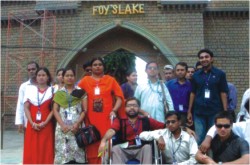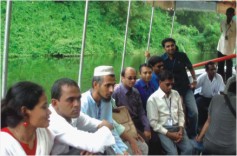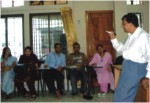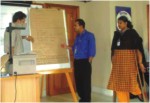Feature
A Different Training for Differently Able
Farooque Hossain Kamrul
 Action Aid Bangladesh (AAB), an international organization, is currently working in more than fifty countries including Bangladesh to eradicate poverty and injustice from society. In line with its relentless endeavor to create a barrier free society for PWDs (Person With Disabilities), the organization launched a unique project, the first of its kind in Bangladesh, titled “Creating Role Models of PWDs (Person with Disability) in corporate sector of Bangladesh” to empower PWDs in corporate sector in the country. The main objective of this project is: Action Aid Bangladesh (AAB), an international organization, is currently working in more than fifty countries including Bangladesh to eradicate poverty and injustice from society. In line with its relentless endeavor to create a barrier free society for PWDs (Person With Disabilities), the organization launched a unique project, the first of its kind in Bangladesh, titled “Creating Role Models of PWDs (Person with Disability) in corporate sector of Bangladesh” to empower PWDs in corporate sector in the country. The main objective of this project is:
(1) To enhance the capacity of educated PWDs in order to make them competent for employment opportunities.
(2) To create role models for PWDs in Bangladesh as professionals in corporate houses.
 The key activities of the project are to arrange an intensive training and then provide internship for disabled persons, which will eventually create an opportunity for them to help get a respectable job in the corporate sector. The key activities of the project are to arrange an intensive training and then provide internship for disabled persons, which will eventually create an opportunity for them to help get a respectable job in the corporate sector.
According to the projects, AAB first selected twenty educated disabled people from all around the country. Most of them were postgraduates, who have crossed university overcoming various hurdles and are now facing great adversity in entering their professional lives. Of the twenty, eleven are visually impaired, eight are mobility disabled and I'm the only one with a hearing challenge. AAB sent us to YPSA- a reputed specialized non-governmental voluntary social development organization in Chittagong, for four months residential training program. It is important to mention here that the partners of the project are Action Aid Bangladesh (AAB), Hong Kong Shanghai Banking Corporation (HSBC) Limited and Young Power in Social Action (YPSA). The training period was July 15, 2006 to November 25, 2006. Truly speaking, I consider myself lucky for being a part of this workshop, as such opportunities for PWDs in our country is scarce. Honestly, it seems to me like a little raindrop in the vast ocean.
 The highly rated training program mainly stressed on English and ICT skills. It also included varying issues and challenges in the mainstream job market. Now, allow me to say something about what I've learned from the program. The highly rated training program mainly stressed on English and ICT skills. It also included varying issues and challenges in the mainstream job market. Now, allow me to say something about what I've learned from the program.
First of all, this training restored my latent confidence, which I had lost after my hearing impairment due to wrong treatment in 2000. Then there was a ten-day business English training course that assisted me immensely to achieve proficiency. I firmly believe that my English is steadily improving after receiving this training, and it was nearly impossible for me to be competent in this alien language without such training. After that, there comes the Management and Administration training, which was a five-day course. Even though the duration of this course was very short with respect to its contents, I got to learn about managing an organization, the role of a manager, managerial goals, problem solving, planning, difference between management and administration, group, team work and the likes. I've also realized various disability issues such as definition of disability, cause of disablement, social and medical model of disability, disability and equality, disability and development, disability right, act and rehabilitation etc. from the training. For a disabled person, I reckon that it's imperative to be knowledgeable in these issues to serve or work properly for the disabled or excluded people in society.
 There was a workshop on HIV/AIDS, a major concern in the current world, specifically for people in the third world countries. I've acquired knowledge of the World situation of HIV/AIDS, vulnerability issues, the cause of HIV/AIDS, preventive measures, treatment and rehabilitation etc. This course also had an informative visual presentation, which assisted me a lot to understand clearly on this serious issue. We all know Disaster and Emergency management is another key issue that cannot be circumvented. Comprehending this reality, we were given three-day training on the topic. The course contained cause of disaster, disaster cycle, disaster management and many more such issues. As the current world is often falling victim to various disasters such as earthquake, Tsunami, floods, cyclones, drought and many other environmental disasters, this training helped me learn many critical things that I'll be able to implement in case of an emergency. I've also been enlightened with Human Right (HR) policy training course, from which I learnt different things like appointment, benefits, separation and long term benefits, office rules, traveling policy, performance management process, grievance policy and code of conduct etc. I deem this course helpful for anyone who wants to work in any corporate office. There was a workshop on HIV/AIDS, a major concern in the current world, specifically for people in the third world countries. I've acquired knowledge of the World situation of HIV/AIDS, vulnerability issues, the cause of HIV/AIDS, preventive measures, treatment and rehabilitation etc. This course also had an informative visual presentation, which assisted me a lot to understand clearly on this serious issue. We all know Disaster and Emergency management is another key issue that cannot be circumvented. Comprehending this reality, we were given three-day training on the topic. The course contained cause of disaster, disaster cycle, disaster management and many more such issues. As the current world is often falling victim to various disasters such as earthquake, Tsunami, floods, cyclones, drought and many other environmental disasters, this training helped me learn many critical things that I'll be able to implement in case of an emergency. I've also been enlightened with Human Right (HR) policy training course, from which I learnt different things like appointment, benefits, separation and long term benefits, office rules, traveling policy, performance management process, grievance policy and code of conduct etc. I deem this course helpful for anyone who wants to work in any corporate office.
 Again, as we all know, to ensure human right and realize legal demand, advocacy is very essential. Thus, this major issue was included in this training program. The training course involved regular computer practice on various fields such as Internet, email and the web searching, Operating Systems, Applications and Databases along with learning how to use a specialized software JAWS (Job Access With Speech) for the visually challenged. Again, as we all know, to ensure human right and realize legal demand, advocacy is very essential. Thus, this major issue was included in this training program. The training course involved regular computer practice on various fields such as Internet, email and the web searching, Operating Systems, Applications and Databases along with learning how to use a specialized software JAWS (Job Access With Speech) for the visually challenged.
There were some exciting recreational and educational tours to historical sites such as Ethnological museum, Foy's Lake, Shrine of Bayejid Bostami, Eco-park and Botanical Garden, Potenga Sea Beach, Mini Bangladesh, YPSA HRDC etc. My personal view is that the overall quality of this four-month training was good but it suffered from time constraint. If I had some more time, I could bolster myself more from this training. Now that the training has been completed fruitfully, I'm ready to face any challenge of the contemporary job market.
There was media coverage from Channel I, Prothom-Alo, Vorer Kagoj, Ittefaq, Jai Jai Din and Weekly 2000 that highlighted the activities and significance of the training program. The coordinator of this training program was Mr Vashkar vattacharya- Program officer, YPSA and Focal Person of DAISY for all projects in Bangladesh. Interestingly, he is also visually challenged.
Though the training has finished, the entire process of the project is yet to be finished. As mentioned earlier, right after completion of training, all trainees were to do internships in various organizations. Although this process is still going on, it seems AAB has been successful in implementing the project, as the majority of the participants have already got jobs in various organizations. Despite this fact, it is apparent that AAB is facing some difficulty with other NGO or organizations for internship and job placement. The main reason behind this might be their (other NGOs or organizations) negative attitude towards PWDs. We, the trainee, sincerely hope that all Government, Non-government organizations, autonomous body or institutions and individuals will come forward to help make this truly humanitarian effort a success for the greater interest of the educated PWDs in the country.
(B.sc & M.Sc in Computer Science and Engineering I.U. Kushtia)
TPD (Trainee Professionals with Disability) Trainee.
|
